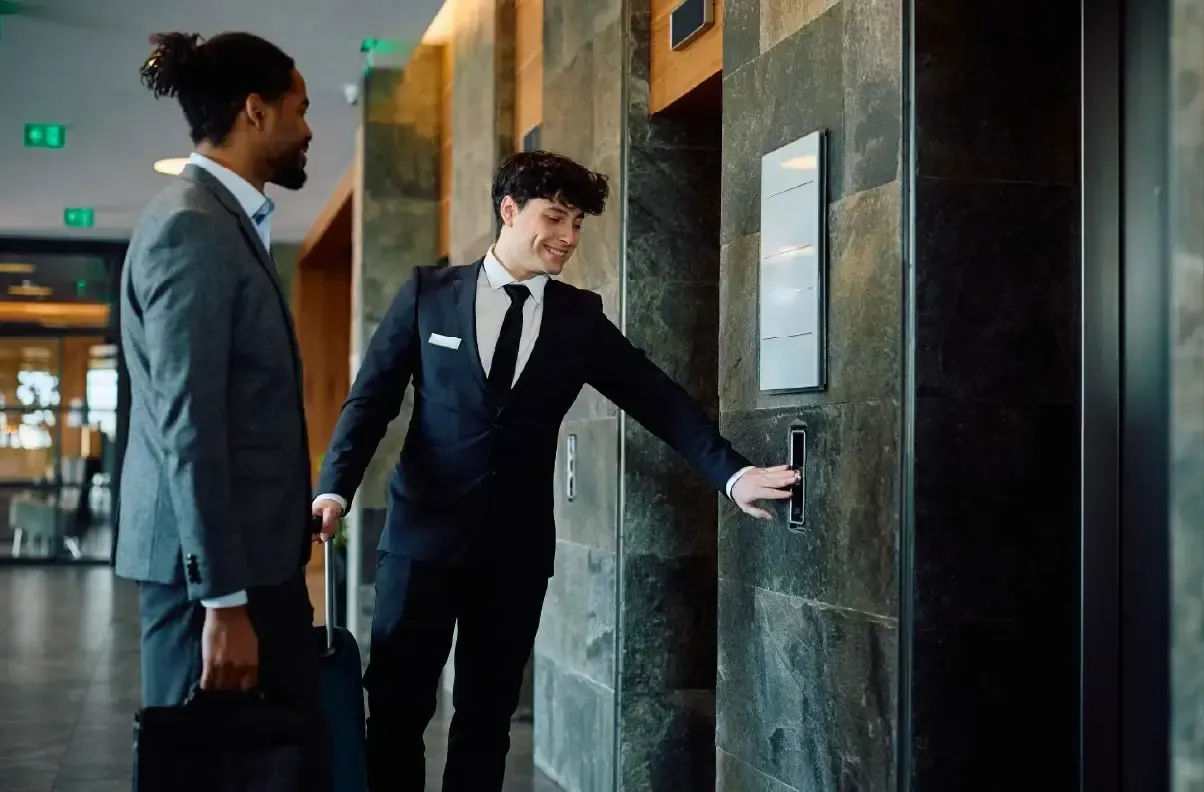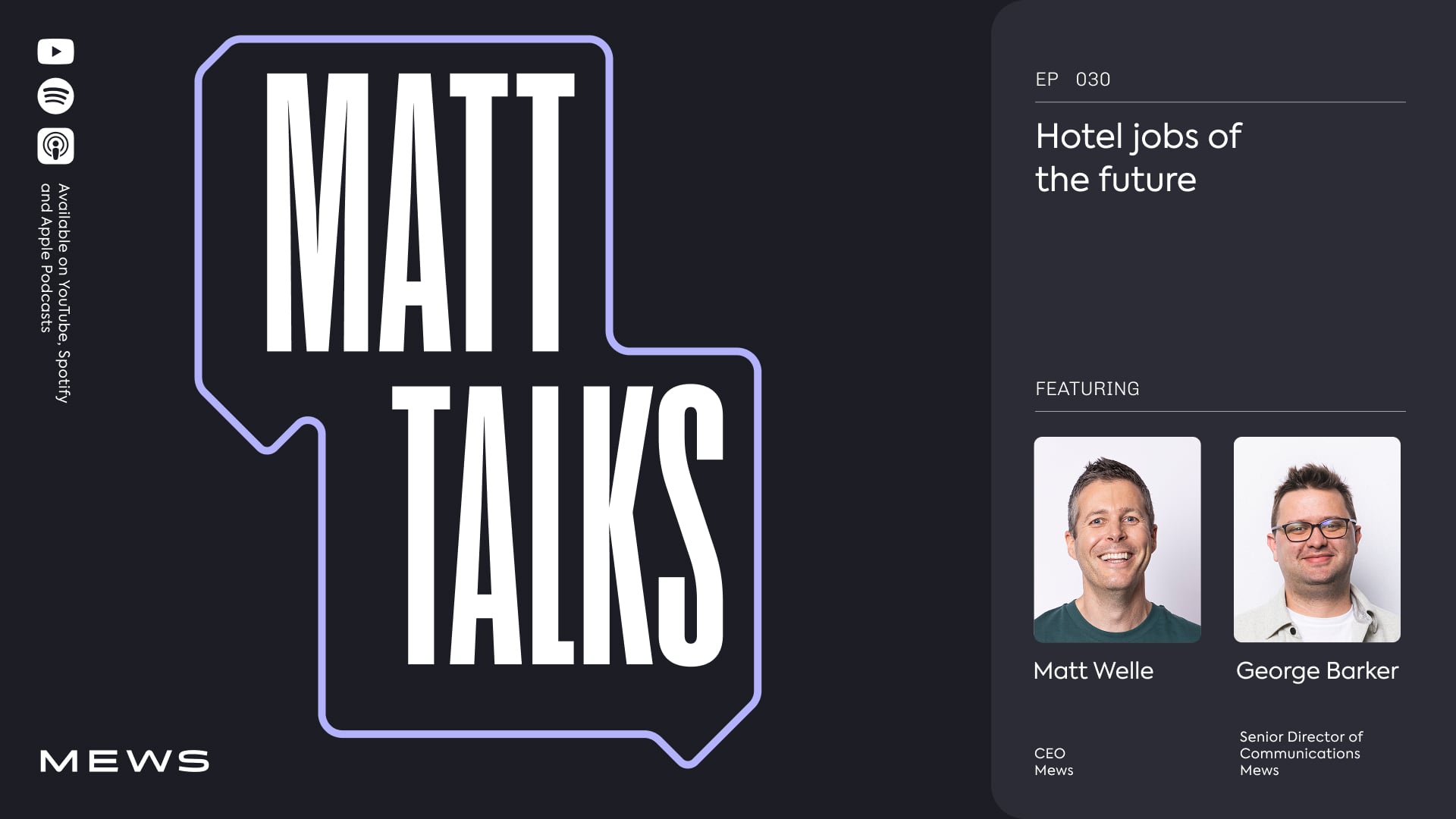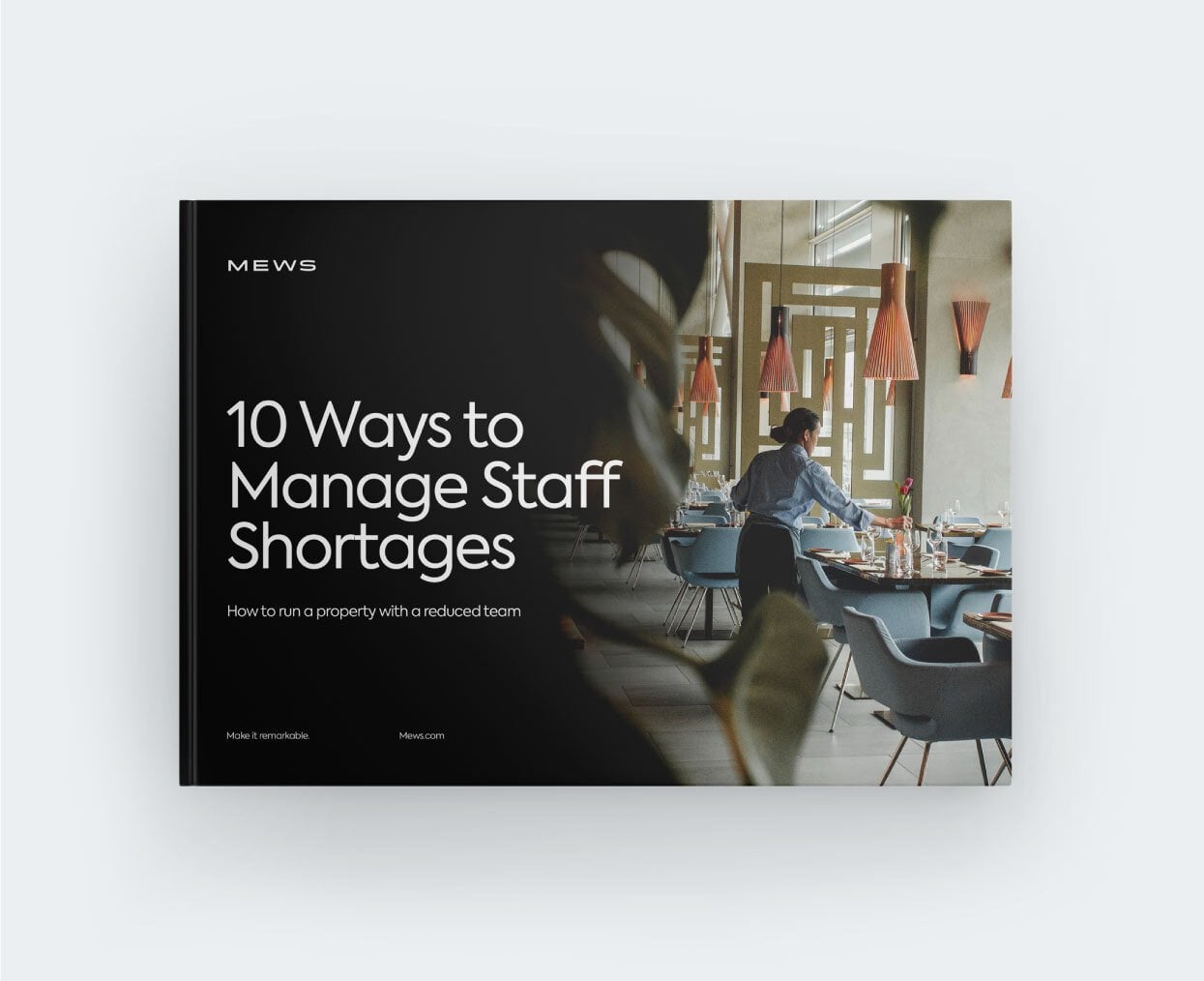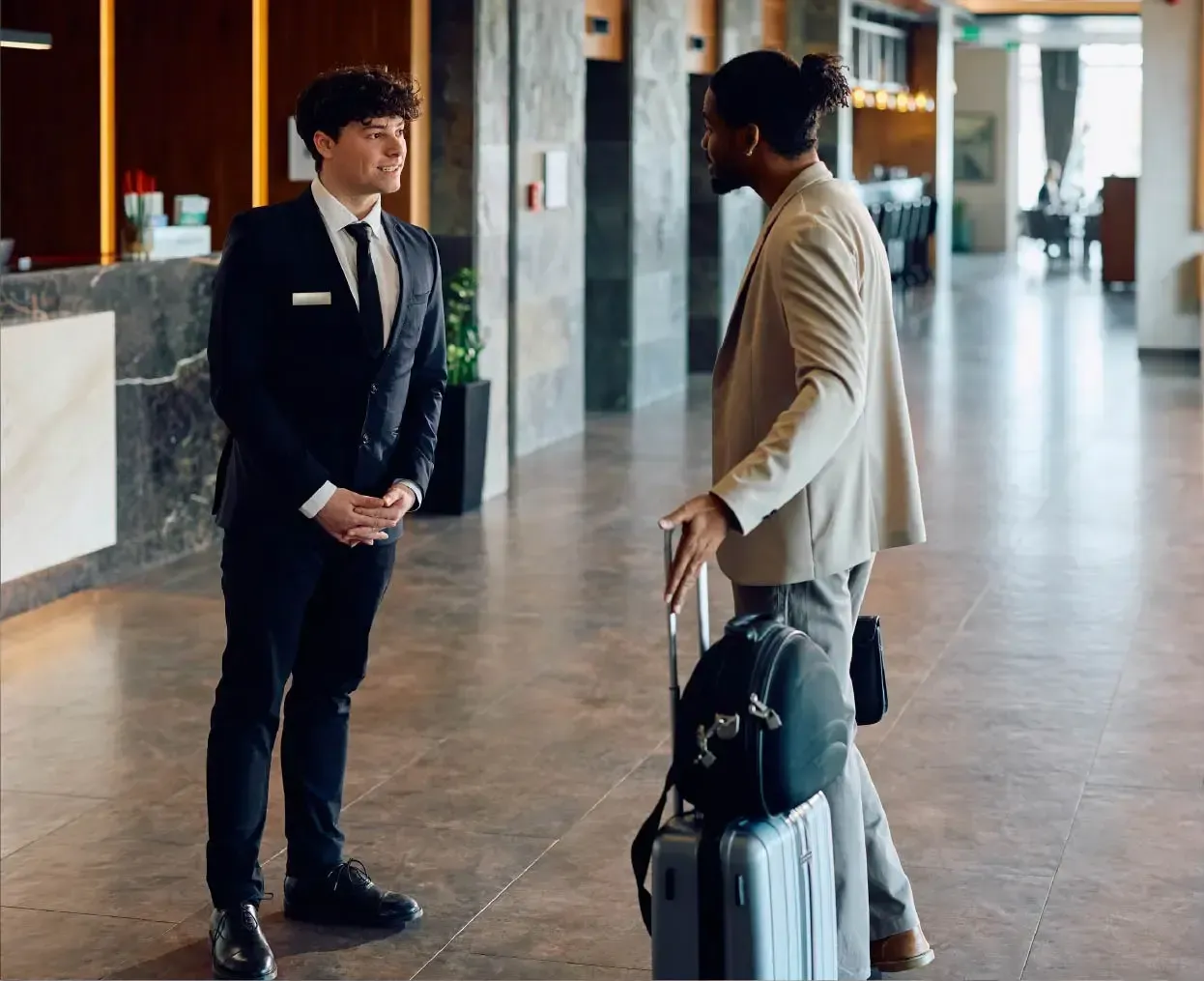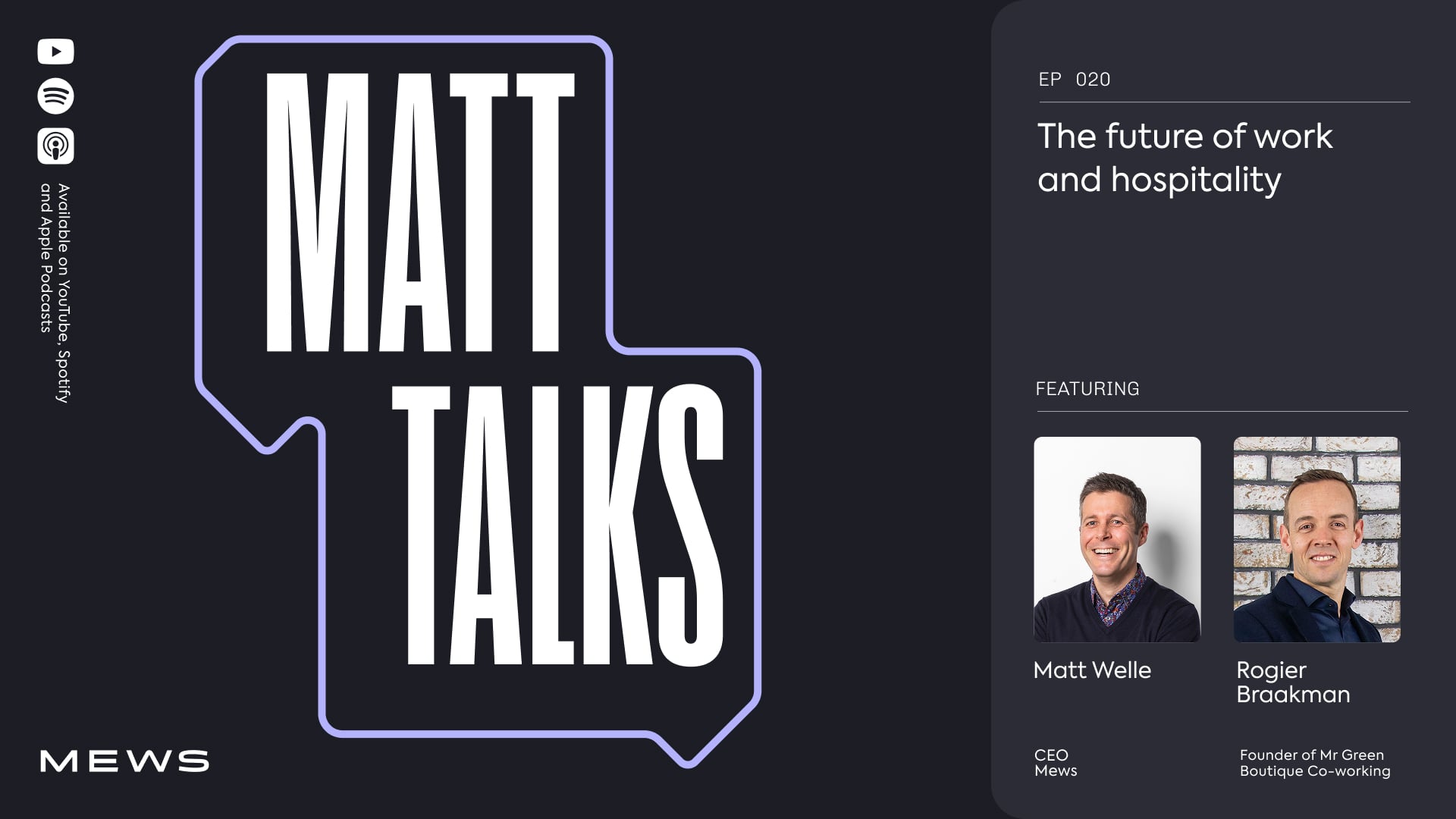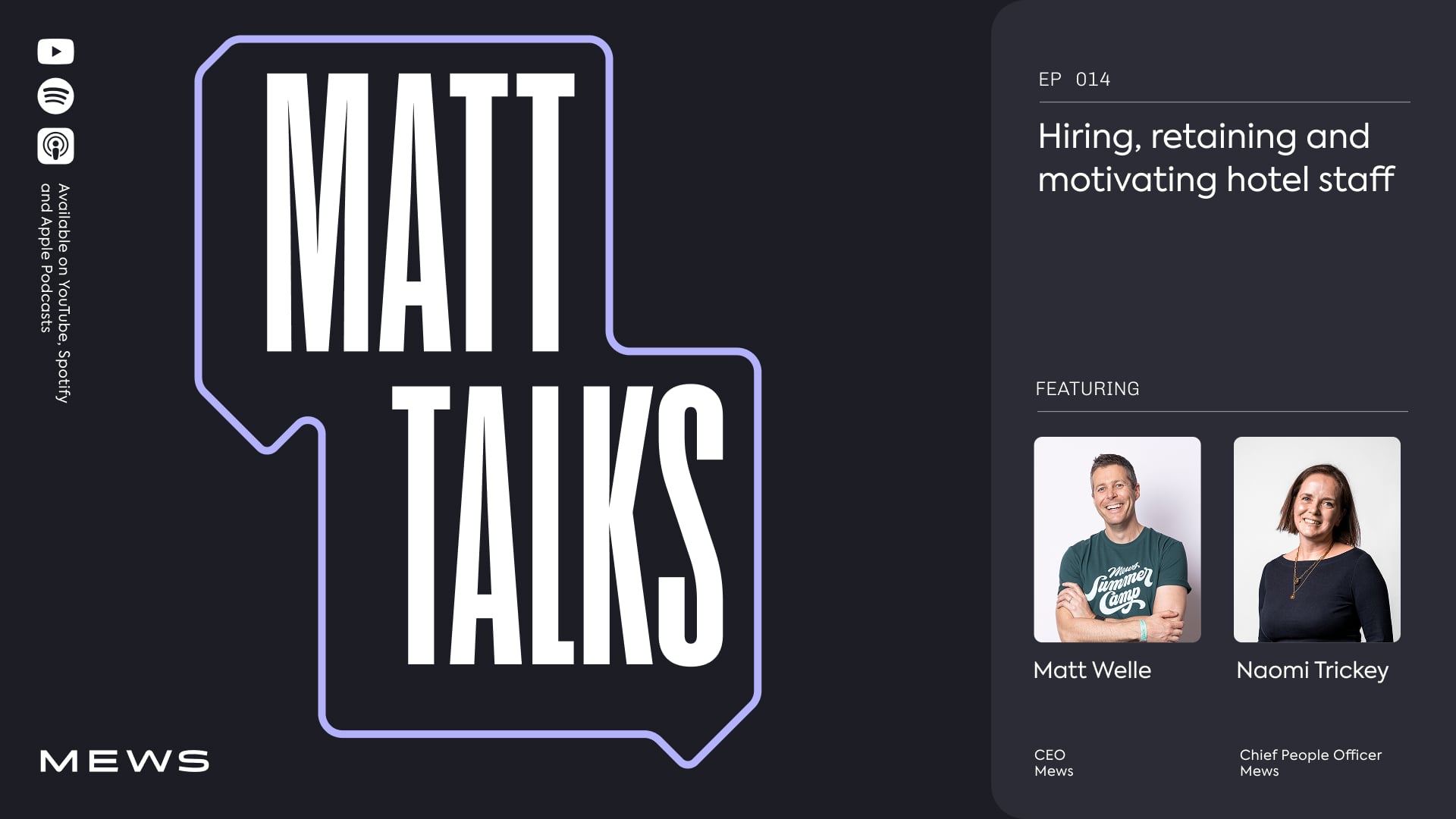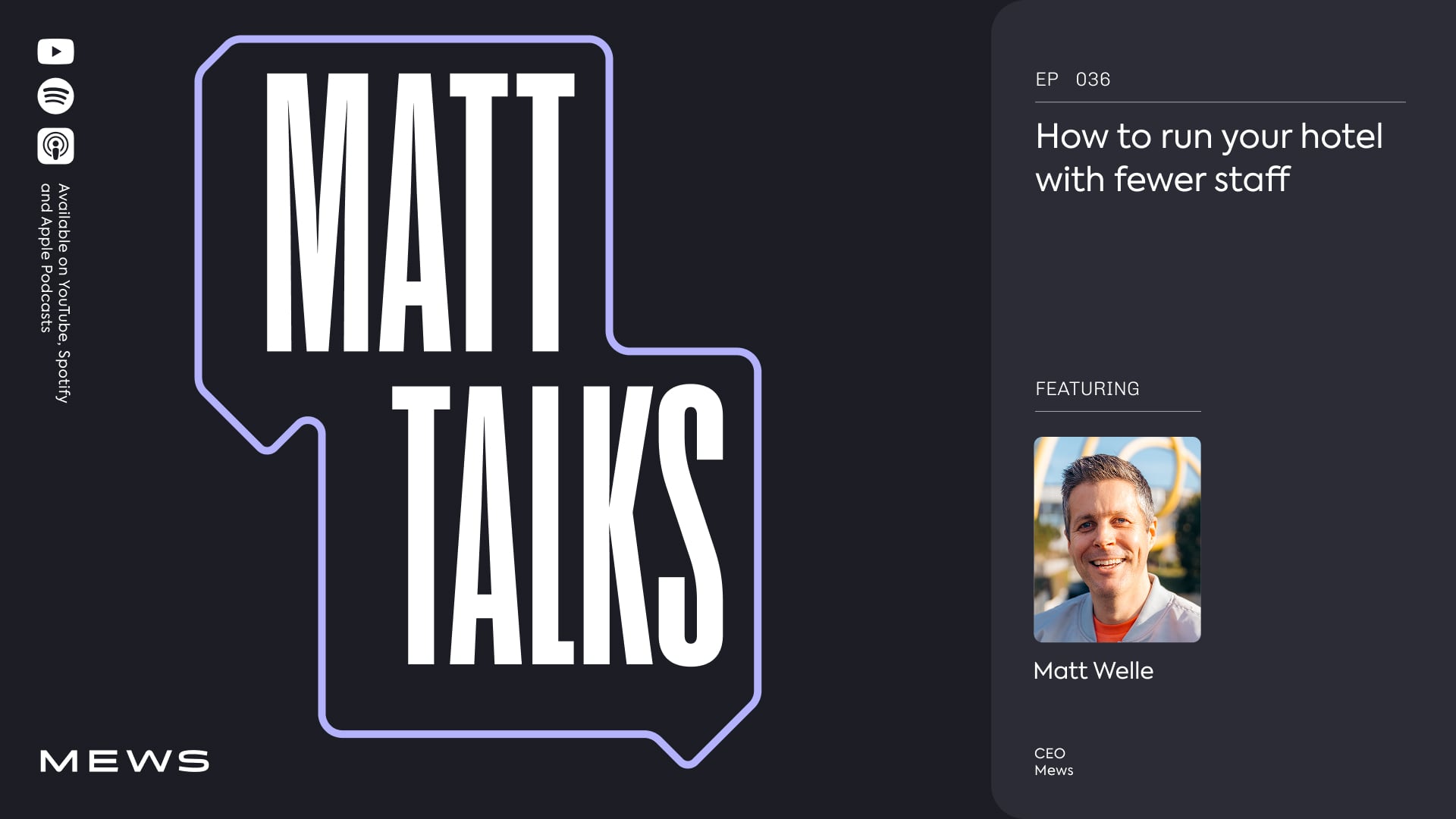What to expect?
Meet your speakers

Matthijs Welle
CEO, Mews
After years in the trenches of hospitality, Matt joined the Mews journey during its early days in 2013. Since then, he’s been our fearless CEO, leading the company and the industry forward.

George Barker
Senior Director of Field Marketing and Communications, Mews
An experienced marketer, George leads field marketing and communications teams at Mews.
Episode chapters
Transcript
Introduction
Hi, everyone. Welcome back to another Matt Talk. And this week, I wanted to have a very different conversation about the hotel jobs of the future because a lot is is shifting in hospitality, especially with the rise of cloud systems. But AI has obviously been a real factor in the transformation of hospitality and the jobs that are in hospitality today, but also in the long term.
So I thought who Immune is the best equipped to talk about this? And it might be George. It might not be. It might not be.
But, George, do you wanna maybe introduce who you are?
Sure. Yeah. So I've had the privilege of working with Matt for about four and a half years at Mews. I am in the marketing organization. So think about how Mews is positioned, what we what we what we talk about, the story, the narrative, the way that we're perceived, our brand every single day, and want to show extreme empathy towards hoteliers about how difficult their jobs are, but also try and push the core conversation about technology and innovation.
So What's your title?
Like, because that sounds like Yeah. What is my title? That sounds like a marketing spiel, but what's your actual title?
Well, again, my title is pretty marketing as well because it's the longest title, I think, at Mews, which is, I think, senior director of regional marketing and communications.
So looking after field operations for marketing, PR, enterprise marketing, big events like Unfold, and partnerships and marketplace partner marketing.
And you've been covering hospitality for a while in previous jobs. Right?
Yeah. That's right. Yes. I when I first started in my career, I I was supporting something called the Hospitality TV channel, where essentially, as a twenty four, twenty five year old, I got to go and interview many of the CEOs and the leaders of hospitality.
Chapter
How hospitality roles have changed
The topic of today's conversation is the jobs of the future in hotels. Let's open up with what are the hospitality jobs that you want that you don't expect to exist in ten years' time from today?
Yeah. It's obviously, technology is gonna become even more pervasive than we currently know it today. And we talk about things like the night audit and the night audit to not being there or and that feels like very old hat for Mews now. But, they've obviously, if you type in night audit to run to LinkedIn, I think there's still a hundred thousand jobs still exist.
It's not an a Mews hotel, but they exist in the Obviously, not an a Mews hotel.
Yeah. But those sorts of things where there's automation and data entry, obviously, I think is the obvious answer here. Reservation agents and things that are taking reservations or event reservations, I think increasingly those sorts of roles will become augmented into roles which are enabled by the technology and that the guest or the reserve or the customer, I guess you would call it in some of these things, has a lot more information and is allowed to input a lot more into, or give a lot more information to the hotel or the space to be able to create the perfect reservation or event for them.
Dare I say it, other roles that I think are on the chopping block or are really being augmented would be I think you're working already, like Yeah.
I know. Well, especially with these two groups of people, which will be lawyers and accountants. So really think about, like, their roles and how that's gonna be changed and the the number that you might need in big organizations and small might change. And then the third like, this is just like, who who do I not like? Like, I'm from marketing.
And so copywriting and or creative have been so so quickly advanced in the in the way that AI has enabled us to do things. And the proliferation or the amount or the speed in which you can generate both copy and creative is a really, really interesting moment that we're currently living in where those sorts of roles can be supremely augmented by the tools that we have. It's similar to, like, a revenue manager. I was having a conversation with our revenue management team the other day, and they were like, we don't want the tool to be too too too overbearing or too complex or too good in a way because the revenue managers who we're trying to sell to wouldn't wanna buy it.
And so but you have this real weird juxtaposition where you're selling to the person that is also being replaced.
Chapter
AI in hospitality
Being being replaced. And that's a really difficult moment. But I think the people that are gonna win in these sorts of things are the ones who lean into that and the ones who who really understand that, yes, my job and my role is changing, and I'm comfortable with that, and I'm gonna lean into this uncomfortable moment. I think anybody who's talking about AI in an eloquent way or in seemingly, like, knows what they're talking about.
Unless you're Sam Altman or somebody like that. I don't think anybody really knows how it's gonna change or shape the future. Yeah. But I think the best place that you can be right now is really leaning into how it can solve problems quicker, how it can increase your output even more, or how it can if in a service industry, how it can make interactions even easier or even more personalized or even more exciting or whatever that is Yeah.
Whatever that kernel is for that guest, even better.
So I think And you talked about that revenue manager role specifically where we're selling to a person who, if they didn't change anything, their job might become obsolete.
How would you consider that role changing so that they don't lose their job, but actually they they they shift into something different?
Yeah. Like, there's this there's obviously these ideas of guest experience managers or people who can curate experiences around you as your guest or you as as the individual.
And and how they do that and how they're unable to do that can be made even better by the use of technology. I was thinking yesterday that maybe there's finally a use for Google Glasses or Meta Glasses. Because if those guest experience people are walking around a hotel and suddenly they see a guest and the glasses recognize them and they've got some information about them in their eyes, then they can then go and personalize that experience to that guest and say, oh, you were looking for bikes? Or what are you going to do? Or, like, what's going on? And maybe, maybe, that is a really interesting, place for a front of house manager or front guest, experience or guest relations team.
Because far off what you're talking about. So we are Completely. On our kiosk and our online check-in, we're now adding a selfie tool so that when you do an online check-in, we ask you to upload a selfie because every device comes with the camera. And with the AI tooltips that we have in the profiles, the moment we recognize the face, we can pull up an AI tool tip saying, you know, have been with us for fifteen times and really, whatever, enjoys whatever.
Yeah. Yeah.
Had the dog that called Beyonce. And those things could happen within the next year, I think, already.
I think it's really interesting.
I think this I think what what we have to be careful of we had a really strong debate in our Paris event we had last year, where the hotel or the business holding data or holding information about guests and guest data is a really interesting space at the moment because but the example in Paris was somebody said, you know somebody's birthday.
Can you write that on the guest reservation notes and keep it so that you can then create an experience when their birthday comes around again? There's a huge debate about whether you can retain that information or whether, no, that actually goes against data privacy rules and and all of that sort of thing. And I think it's the same with a lot of the information that you can glean on certain guests as and when they're staying with you.
Like and hotels do it. Right? So the birthday is the easy thing because when you check-in, you give your passport. They should know your birthday.
However, what they do with it is so uninspiring. Like, I always get a birthday cake on my birthday or whatever, like a nice VIP setup in the room. And I'm just like, it's not personalized. And I think the exciting thing for people that are in a job in hospitality is like, what can we do that is truly unique for Matt?
Like, I'm lactose intolerant. Don't give me a cake with lactose in it. Like, it's a lovely touch, but your AI should have told them that I don't I can't have things with milk in it. Right.
But I still get the the cake with milk in it. And it's it's like the humans needing to really help connect the dots and create these really special experiences based on the information that they're fed. And I think that's the future of these jobs that are morphing from, can I have your passport and your credit card? To, what are we gonna do for Matt?
That is that is memorable.
And isn't that so much more exciting as a as a career? Because a lot of the jobs in hospitality are pretty transactional. Like, they're they're like, you're here for six months or and then you move on. And obviously, you were a part of a hotel.
Richard's been part of a hotel, like, and that and that's been a career for for you both. The majority of people are not there for the long term. But imagine imagine it's such an exciting space to go and work if you're talking in these terms and if you're thinking in these ways. Because suddenly, you know, not all guests are gonna be great.
Like, they you know, you're gonna get some wrong ones in there. But the ability to create incredible experiences for people, I think, is an incredibly rewarding place Yeah. To be. Be you in the front office, back office, wherever it might be.
I think I think people really love people other people being happy, I hope.
So if I go back to the question we started with, the jobs that will disappear, you mentioned reservation agents, group reservation agents, revenue manager, nights auditor.
Chapter
New roles in hospitality
These are all back office jobs. So it sounds like these are the the people that are in the back office are doing the really difficult work that we needed humans for, but actually AI is so good that it can take over. Are there jobs that are being created for our industry that didn't exist before?
Yes. Like, we've spoken about guest experience creators. I think we're gonna increasingly see technologists or tech operations people within hotels who are constantly thinking about the ways that solutions, be it once they build off of the back of an API themselves or once that they buy, like Mews, how they can create better back office experiences or enable better back office and front office experiences. And those sorts of people are gonna be that bridge between hospitality and technology that are gonna be so in demand because consumers and guests are having pretty advanced tech experiences in their everyday lives.
Like, the Ubers is a great example, obviously, and as you do self checkout at a supermarket. Yeah. We're exposed to all of this stuff across all of our life now. And somebody who's thinking about the way in which we can scale personalized experiences is through the technology in which you implement.
It's gonna be really, really an interesting thing to watch and see.
And yeah. Like, I think I think those people who are technologists, not necessarily coders, not necessarily engineers, but those who can create the right prompts to build the thing or to create the thing.
Start thinking thinkers almost, like, who think through the challenge and they who can step away from, right, let me think about this hotel end to end guest experience, and you can map that out in their head and thinking this is where I need a solution. But that is a very specific skill set that you have to look for. That is not a skill set that we've traditionally hired for in hotels. Yeah.
Well, and and it's like you you when you're faced with a problem, you always try and go and solution it straight away. It's like it's this constant thing that you try and do. You gotta really consciously take a step back and go, no. Like, here's how I think it's gonna work.
Here's the the business strategy of, like, we wanna grow our portfolio of hotels from five now to twenty five in ten years. I don't know. Yeah. And and, like, how are we gonna do that?
What are we gonna white label? What do we need to build?
Do I need to, go and engage with thirty tech providers to go and best in class it and build my tech stack? Am I gonna choose one all in one? Or am I gonna go and do a do a combination of them both? I think I think people, you know, we can't know as Mews what that hotel wants to do or what they or how they want to operate. And we certainly don't know who their guests are necessarily.
So it's up to them to decide. And I think those people who can bridge what we're saying again, going back to what I originally said, empathizing with hoteliers, but also pushing innovation with technology Yeah. And not ostracizing hoteliers by saying, well, you need to do AI this and AI that. Yeah. Dude, we're still we're still not on the cloud or, like, we're still over here. So those people who can think about that, I think, are gonna be really, really important going forward.
And if this first principle thinkers, like, saying and this is a thing that has shifted in the last few years with AI coming in because, actually, you shouldn't think about what we've done before because, actually, that no longer matters. So if you were to solve a problem, you say, let let me step away from this and let me holistically think about the experience without taking into account all the departments and all the humans that I have across this hotel. What are the problems that we have to solve for? How would I structure that?
And then you start to fit in the people below it. But very few do that. When we come into a hotel with Mews, they're like, great, I'll just rip out the old system, I'll put Mews in, and then we just run it like we've always run it. And I think you don't achieve the right results in in a hotel like that.
Chapter
The future of general managers
When you think about the GMs of the future, because the GM is the leader of innovation, and they've always come up through food and beverage at front office. Those are the paths that people come in. What's shifting in that particular role?
I think the title will stay the same as General Manager. So we hopefully, I currently understand it. But the role of the general manager, I think, is is incredibly entrepreneurial.
It's constantly thinking about ways in which you can, you know, drive guest loyalty, drive direct bookings, create incredible experiences for your guests on-site. And we've got numerous examples now of general managers not only leveraging Mews, but thinking about the guest experience in completely, fundamentally different ways.
And that's all being enabled by the technology in which they're implementing.
If you if you were the hotel owner and it was your job to hire the GM of the future, what would the profile of that GM of the future be like?
Yeah. Like, I was I I actually think about this in my own hiring sometimes, not as a general manager, but in my own hiring philosophy for my team. And it's like a propensity to empathy, like a strong empathy towards the challenges, the problems, the people. Yeah. Obviously, you've got to be a people person and then an attitude to action. Like I I don't think anybody knows the right answers. But what frustrates me the most is is, you know, sitting on something or or waiting for something to be perfect.
And I think those sorts of roles are gonna be incredibly potent, and that is the job role of the general manager. Like, you lean into that uncertainty.
You go for it, and you think about ways in slightly different ways, or you're open to different ideas, I like opening the floor to really junior people in my team. Because, of course, the way that they engage with something like a large language model, to me, I just I think I use it as an extension of Google. Yeah. Right?
And that is predominantly how people, like, thirty up use it. But as I as I think about new people entering the workforce, I think they're using it in an entirely different way, and I wanna learn from them. And so a constant constant, sorry, ability to learn is going to be really, really important. But that that emotional intelligence, I think, is going to screen through for, most leaders.
I just had a meeting with a news team member, and I I look for people that can be transformative in the way that they use AI. And I I always ask questions about AI in the interview now. And I said, you know, if I wanted to build an app, like, where would I begin? And he said, like, you go in ChatGPT and you just you know what the problem is that you wanna solve and you you work with ChatGPT to say, I need a script to build an app to solve this problem, and this is what I want it to do.
And then give it to me in a script that I can then use in Lovable, which is another AI tool that actually builds the app for you. And ChatCGPT helps you build the script. Then you go into Lovable, and it builds you the app, and that app can be live within a day. And, and honestly, within one day you can learn how to build an app end to end.
And yes, it might not be a Mews type of system. It might be a chat app that you build for your hotel on your website, but it's one hundred percent possible.
And a lot of hoteliers have this fear of like, yeah, I don't really understand it.
It's like, I don't understand it. No. But I'm about to I I will go in and I figured this out. And just don't be afraid of it.
Just try it. And if it fails, then you ask Chat GPT, what did I get wrong? And it will actually tell you what you got wrong. Yeah.
But the thing that hotels hoteliers have is a deep understanding of the problems that they're looking to solve. And then that is what's driving these kind of great outcomes. But it's this mindset that we need to find. And I think when you do interviews, ask them about how they use AI in their day to day life because it will tell you the kind of person that you're having in front of you.
Yeah. Even if you're just experiment. I mean, I was just playing Lego this morning with my kids. They don't know what they're doing, but they're sticking things together and they're trying stuff out.
And you don't know where it's gonna go, but suddenly, it becomes something and, you know, your your imagination trade. It's in that yeah. Right. But, like, that's great.
It's almost like my my my my answer to that question about how you use AI AI every day is is I just I just try. I just, like, throw shit stuff at it and see what happens. And and oftentimes, I'm amazed by the results that I get and, like, building landing pages. Direct booking has always been sort of this conversation that I remember having way back when.
Chapter
Competing with OTAs
And it was like, you know, do you compete with OTAs and all of that sort of thing? Well, actually, now I think you have the ability to do that. Not through any fault of your own, but, like, if you are optimized to be discoverable by these large language models, then booking Expedia, how are you gonna respond? Because people are just gonna start booking direct if you've been able to curate experience like, curate your, I don't know, online experience.
So and and it's the role of the the marketeer in the hotel who traditionally was just building the website and doing something. You're working with a blogger to to create content. I'm like, no. No.
You can do your own content really fast. You can spin up a a landing page. So what's important for JetGPT is, getting as much talked about you online and lean into that conversation. If they're talking about the great appearance you have for dogs specifically, you're seeing that chatter happening on TripAdvisor, great.
Spin up a landing page that talks specifically about what you do because then you're discoverable and then you can have a booking engine there with very specific facilities for pet owners. And that doesn't have to be your standard booking engine, it can be just specifically on that landing page. And if you ask that question to the marketing person saying, can you just spin up a landing page? And they're like, I don't know how to do that.
You know that you've got the wrong person because this is so easy today. Like anyone should be able to spin up a landing page, deploy a booking engine with a custom kind of dog kind of features in there. But it's that skill set that people are missing. So, should every hotel or every hotel brand have a chief AI officer, you think?
No. And the reason I say that is because AI is just going to be it's like it's almost going to be like, should you have a chief email officer as we understand it today? Your AI officer is just, like, nonexistent because it is everything. It's like it's like a it's so pervasive. Everybody's using it. Maybe you need a CEO who prompts the prompts in AI to go, have you thought about this or have you thought about that?
Or here's the AI wrapper so that you can GM, the chief AI officer.
Well, that's an interesting idea. Yeah. Probably.
They need to they need to stimulate people to embrace the new technology. And if the GM doesn't live it, then it's not the culture, and then it will never happen.
Yeah. I think that's probably where it's at. And and, I mean, the other thing is that you're having people enter the workforce now where AI is just like part of their life. Yeah.
We're learning it. Right? We're in this era of, like, learning AI, learning how, and getting excited about it. But I think about as I think about my kids going into education, is the fact that they don't know a language gonna be such a barrier in twenty years time?
Don't know. Probably not. So why would we look at languages? Is accountancy a job that I want them to go in?
Is law a lawyer a job rather? Probably not because information has been democratized. Right? Everybody has access to all the information.
So, yeah, the general manager If I think about several jobs will will disappear inevitably.
It's a lot of the back office jobs will disappear. Some roles will do more of which is these guest experience jobs where people get to really be creative but create these experiences. And that's actually the fun jobs. Like, a receptionist used to be a passport and credit card process, data entry person.
Not very exciting. Suddenly that job is being taken over, but actually they shift to a much more fun and engaging job. I think IT managers will disappear, but suddenly you can hire a Gen Z er who is a structural thinker, first principle thinker who can think through some of these experiences. What's the profile that if you think about hotel schools and, you know, or where we get talents from, like it used to be hotel schools.
Will it be hotel schools? And and what's kind of wrong with education today to get the next generation ready for what's happening in our industry?
I always look to hire for somebody, and I think I think this is a hopefully, it's quite distracting. To hire for something different.
Hire for somebody who's gonna push into everybody says, like, oh, hire better than you, yada yada yada, whatever.
But hiring different perspectives, I think, is a really important thing. And hiring for, people are gonna rub each other on the wrong way. But I think in terms of hiring out of hotel schools, I think schools in general are gonna have to completely upgrade the way that they think. You know, if you think about reading out of it learning out of a textbook, well, you know, you can get Harvard courses on YouTube now.
Like, you you you could you don't have to spend hundreds of thousands of dollars on going to Harvard because the lectures are on YouTube. Like, that information has been democratized idea. Like, education or where we hire from or how we hire. Yeah.
Gosh. That's such a big question because I I'm, like, anxious about my kids and where I send them and, like, you're learning out of a book. Do you even need like, do you even need to do that anymore? Like, is it more important to learn and understand the cultural differences of, like, doing business in Japan versus doing business in America versus doing business in the UK versus doing business in Prague?
Like, those nuances, I think, are gonna and certainly for for a hotel, who have international guests, that way that you interact with them is gonna be really important to understand. Can't. AI can't do that. Yeah.
But but AI can certainly democratize data for you.
Like, we we just hired someone out of a hotel school, and we hired them not because of the hotel school, but because they had this entrepreneurial spirit. Mhmm. And they had started their own business right out of a hotel school. And then if through that, they learned really critical skills about what's involved with with being an entrepreneur.
And I was like, great. That is that is what I want in Mews. Someone who's unafraid to do something crazy and fail at it, but then Yep. Do something different.
You want those people in your hotel. Some people who are just, like, building a brand that is unique, that customers travel back for, and it won't be your traditional people that have worked for all of their lives in front office because they know this how the system works. You need that mindset. And it's, it's, it really is a different kind of mindset that you might not find in hospitality schools.
You might find that in tech school or in a completely different education. So the way that you attract talents, your brand, your employer brand is really critical that you're very specific about what you're looking for in the job profile. That you don't look for skills of, you know, I want them to work with the legacy systems that we have deployed in our hotel. No, no.
I'm looking
Chapter
Job descriptions for modern roles
for an entrepreneur to come into the hotel and you have a remit to just transform. For example, revenue management.
Like how are you driving the revenue of the hotel forward? And that's the assignments. It isn't how do you drive the room rate up? It is how do you drive total revenue of the hotel forward? So the job description has to change. Otherwise you won't get the applicants in into the job to apply and you will never make that change downstream. And it all starts at the at the top of the funnel.
Well, then it's every level. Right? You've said you've just hired out we've just hired out a grad from school. Yeah. You've got that level and yourself thinking in these ways, like strong empathy, strong propensity to empathy, right attitude, entrepreneurial spirit, leaning into uncertainty.
Those I love those those sorts of people. I love having conversations with these sorts of people because they always, always are curious about the problems, and they wanna try and solve them, and they wanna come come up with ideas and solutions to get to get better as an operation.
What's one as a last question, like, what's one hotel job that you would want to take on in this new kind of world of hotels?
Lifeguard.
I wanna sit in the sun.
I don't know.
Like, I love the surprise and delight moments when I get when I receive them, when I get them. Like, I love little, like, memories or moments that are created that, people remember forever.
And and so it'd be something like that. Something like where I'm probably wearing these glasses.
We've got the selfie from the guest. Yeah.
I'm walking around the hotel and just literally trying to make everybody's day a little bit better through Yeah.
The information that I've got.
I think if I think to this conversation, it does sounds like a lot is going to shift and we make it sound like a lot of jobs will disappear, but I don't think it will happen overnight. I think they'll slowly change or actually pretty fast, they'll morph into something different. But if you're one of those forward thinking hoteliers, be at the forefront, go to your job descriptions and start with that to start slowly hiring a different profile and enabling them to make an impact. And you'll see these jobs morphing because you no longer need people to manually take reservations if you have someone who can deploy a bot on your, on your website that can do these things.
It is change is coming and we have to just be ready for it. But it's also one of the most exciting things for hospitality. Like it means we get to deploy humans to create these really, really special experiences. And that's the thing that I take away from this conversation.
The future is bright, but it does require us to just shift our thinking. Yeah. Thank you.
Well said. Thank you, Matt.
Thank you. My privilege.
Thank you.



